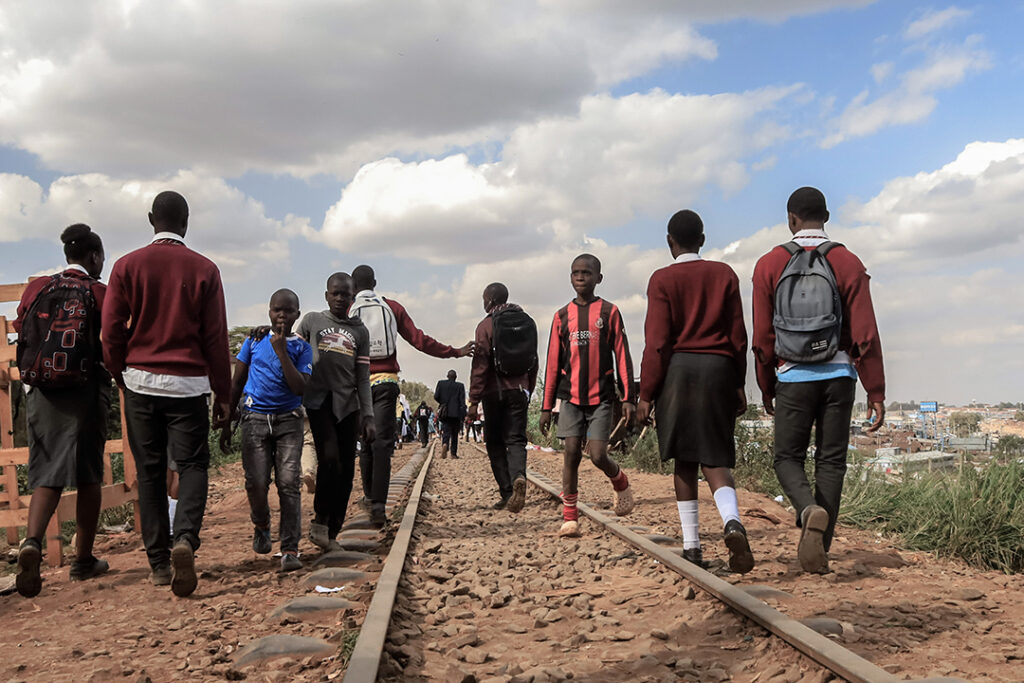ADF STAFF
Africa’s young population can be or a source of instability or a springboard to prosperity. Experts say it’s up to the continent’s security and political leaders to harness this “youth bulge” to create a better future.
“We need to ask ourselves, ‘Can Africa seize the opportunities being presented?’ Or do African youth constitute a ticking, demographic time bomb?” said Dr. Joel Amegboh, an assistant professor at the Africa Center for Strategic Studies (ACSS), who researches “youth peace and security.”
The term “youth bulge” refers to a demographic pattern in which a large share of the population is composed of children and young adults. It also includes the high numbers of unemployed young people.
Africa has a median age of 19.7 years, the youngest population in the world. By 2050, one in three young people will live in Sub-Saharan Africa. However, there is a mismatch between this young population and available opportunities. Each year about 10 million to 12 million people enter the labor market while only about 3 million formal jobs are created.
Unsurprisingly, this can have security consequences. According to the World Bank, 40% of the people who join rebel movements are motivated by unemployment.
Amegboh believes these same young people can be a force for good if given the right tools. “Can the energy of African youth be harnessed to drive economic growth and lift the region out of poverty? The African continent now stands at a crossroads,” Amegboh said.
One country trying to answer these difficult questions is Nigeria. When it adopted its National Action Plan on Youth, Peace and Security on November 1, 2021, it became only the second country, after Finland, to endorse the United Nations’ resolution on the challenges facing young people.
The U.N. Security Council’s 2015 resolution on Youth, Peace and Security recognizes that “young people play an important and positive role in the maintenance and promotion of international peace and security.”
The U.N. identified five key pillars for action: participation, protection, prevention, partnerships, and disengagement and reintegration. The resolution urged member nations to give young people a greater voice in decision-making at the local, national, regional and international levels and to consider setting up mechanisms that would enable them to participate meaningfully in peace processes.
A 2021 ACSS report noted that 16 countries in Africa are involved in major armed conflicts while others face political instability and various forms of violence, including terrorism.
During an August 11 ACSS webinar titled “Trends: Youth Bulges, Security and Peace in Africa,” speakers said that it is a mistake to assume that Africa’s young and unemployed people are responsible for the violence consuming so much of the continent.
Dr. Olawale Ismail, a lecturer at King’s College in London, said that young people in Africa are the biggest victims of violence and the biggest promoters of peace. “They are not violent, so we should stop stereotyping them,” he said. “They are changing Africa in less-violent ways.”
Over the past two decades, Ismail said, young people have staged mass protests for fair elections and human rights, “taking ownership for changes in society.”
A particular concern is the growing population of young people among Africa’s refugees and displaced persons. The U.N. reports that more than 31 million Africans live outside the country of their birth, with the majority somewhere on the continent. Many millions more are internally displaced, which means they have had to flee their homes while remaining in their home countries.
“Of the number of migrants on the move in Africa, the majority of them are young people,” the U.N. concluded in a 2021 report.
Officials have called on the African Union to do more to help give a voice to Africa’s young people. The AU already has developed several youth development policies, including the African Youth Charter, the Youth Decade Plan of Action and the Malabo Decision on Youth Empowerment.
The African Youth Charter protects young people from discrimination and ensures freedom of movement, speech, association, religion, property ownership and other human rights, while committing to promoting youth participation throughout society
The Youth Decade Plan of Action focuses on education and skills development, employment and entrepreneurship, governance and security, farming and climate change, and health and reproductive health rights.
“The African youth of today are not like any previous generations,” said one audience member during the ACSS webinar. “They are promoting the principle of peace silently, through digital-based social media, by tracking patterns and using their creative energies.”

